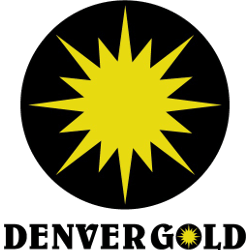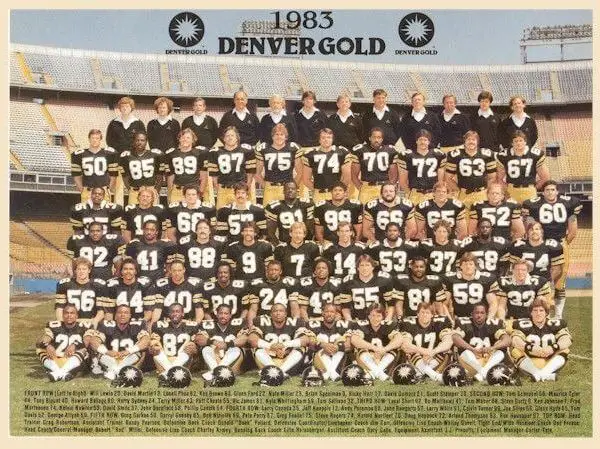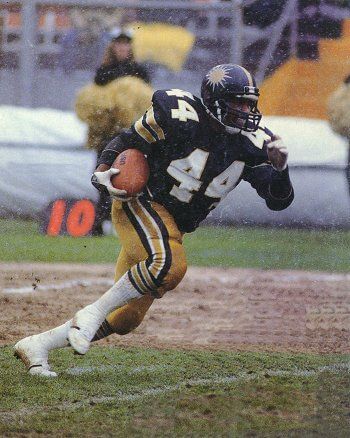
Established
1983
City
Denver
League History
1983 – 1985 / United States Football League
Team History
1983 – 1985 / Denver Gold
Nickname
Gold – The Denver Gold, one of the most beloved teams in the history of professional sports, has a unique and exciting nickname with its roots in American football. The team was part of the United States Football League (USFL) during its brief existence from 1983-1985.
Denver Gold Origin
The name “Gold” comes from an old mining term used to describe large deposits or veins of gold ore that prospectors discovered during America’s westward expansion into Colorado and other parts of western North America. This connection to gold reflects a sense of nostalgia for this period in American history and their home city's reputation for being "the mile-high city."
The USFL had many great teams with colorful nicknames, such as “Giants," Stars," and even "Gunners."But none could compare to the impact of Denver's own Gold, who captured fans' hearts with their exciting brand on offense and defense led by legendary quarterback John Elway who became one of the NFL's greatest quarterbacks ever.
While some may question why they chose such an unusual nickname, it speaks volumes about how much pride they took in representing their hometown and honoring those brave pioneers who ventured out into uncharted territory looking for fortune and adventure centuries before them. So next time you hear someone mention 'Denver Gold,' remember where it all began!
Original USFL Team
Yes
Final USFL Team
No
Team’s Final Outlook
Doug Spedding knew that the Gold could not hope to compete with the Broncos; shortly after the 1985 season, he cut a deal to merge the Gold with the Jacksonville Bulls.
Championship
USFL Championship 0
Stadium
1983 – 1985 / Mile High Stadium
Owner
1984 – 1985 / Doug Spedding
1983 / Ron Blanding
Coaches
1985 / Mouse Davis (11 wins – 8 losses)
1983 – 1984 / Craig Morton (12 wins – 12 losses)
1983 / Red Miller (4 wins – 7 losses)
- 1983
- 1985
-
Gold Team Formation
The team’s original owner, Denver real estate mogul Ron Blanding, held fast to USFL founder David Dixon’s original blueprint for the league. He kept tight controls on expenses (including player salaries) while heavily marketing the team in the Rockies. The Gold’s original coach was Red Miller, who led the National Football League’s Denver Broncos to their first-ever Super Bowl. However, ... -
Competing with the Broncos
Unfortunately, just after Davis took over, the USFL announced that it would switch to a fall schedule for the 1986 season. Knowing that the Gold could not even begin to compete directly with the Broncos, Spedding was one of two owners (the other being Tampa Bay Bandits owner John F. Bassett) to vote to stay on a spring schedule. His ...
To qualify as the greatest player for this team, the player must have played one season for this team. If not, we will remove the player.
* verifies that player has played for this team as an added player by a fan.
Denver Gold History
The Denver Gold was a professional American football team that competed in the United States Football League (USFL) from 1983 to 1985. Based in Denver, Colorado, the Denver Gold football team played its home games at the iconic Mile High Stadium. The franchise was founded by businessman Doug Spedding and became one of the twelve original teams in the league’s inaugural 1983 season.
Under the guidance of head coach Red Miller, the former Denver Broncos coach, the Denver Gold USFL franchise developed a solid fan following in its early years. The team’s balanced approach on offense and defense allowed them to stay competitive in nearly every game. In their debut season, the Gold achieved a respectable record and became one of the better-performing expansion teams in the league.
By 1984, the Denver Gold began showing steady improvement. With a stronger lineup and renewed focus, the team posted a winning record and reached the playoffs for the first time. Key players like quarterback Ken Johnson, running back Harry Sydney, and wide receiver Leonard Harris contributed significantly to their success. Their disciplined play and growing team chemistry helped the Gold gain recognition among USFL fans across the country.
Gold Achievements
In their final season, the Denver Gold football team continued to fight hard despite financial constraints and uncertainty about the league’s future. Coach Mouse Davis, known for his “run and shoot” offensive style, took over the team and introduced an exciting, fast-paced offense. This approach gave fans thrilling games at Mile High Stadium, even as attendance numbers began to drop due to off-field issues within the league.
Unfortunately, the Denver Gold USFL franchise faced severe financial challenges that ultimately led to its demise. After the 1985 season, the USFL folded before the planned transition to a fall schedule. The team’s closure marked the end of professional spring football in Denver for decades, but its impact on the league’s early years remains significant.
Playoff Appearances
The Denver Gold reached the playoffs twice during their three-year existence, demonstrating impressive consistency in the competitive USFL landscape. Their back-to-back postseason runs showcased their strong defense and efficient offensive unit.
Fan Support and Legacy
Despite financial struggles, the Denver Gold football team attracted some of the largest crowds in the USFL, often filling over 40,000 seats at Mile High Stadium. Their dedicated fan base helped keep the spirit of spring football alive in Colorado and made the Denver Gold USFL franchise one of the most beloved teams of its time.
The Denver Gold may have had a short existence, but their legacy continues to live on among fans who remember the excitement and energy they brought to Denver’s football scene during the early 1980s.
Sports Fan Products
Auto Amazon Links: No products found.
Accomplishments
1985 / Division Championship Game (vs Memphis Showboats 7 – 48)
Averaged 41,736 in 1983, 33,953 in 1984 and 14,446 in 1985 (51,706 seat stadium)
*Blue is this team’s history






